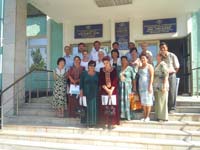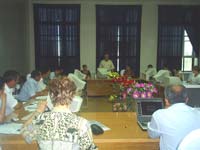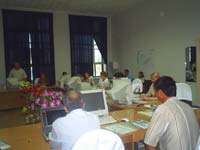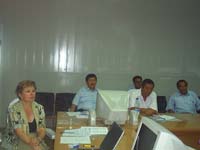WORKSHOP “GENDER ASPECTS OF WATER MANAGEMENT IN THE LOWLANDS OF AMUDARYA AND SYRDARYA”
On 29 June 2007, SIC ICWC organized the first regional workshop “Gender Aspects of Water Management in the Lowlands of Amudarya and Syrdarya” under the project “GWANET – Gender and Water Network in Central Asia”. The workshop was held in ICWC Training Center’s Branch in the Urgench city (Uzbekistan). The representatives of water-management institutions and of NGOs from Kazakhstan, Kyrgyzstan, Turkmenistan, and Uzbekistan took part in the workshop.


Within the framework of the project “GWANET – Gender and Water Network in Central Asia”, it is planned to hold awareness-raising workshops for all Central Asian countries concerning gender equity in water sector and creation of GWANET Network. The Urgench workshop was dedicated to present to the participants from Kazakhstan, Turkmenistan, and Uzbekistan the GWANET Network’s aims and objectives.
Organization of the workshop in one of the most socially tense regions – the lowlands of Amudarya – set the second workshop objective, that is to identify specific, for the lowlands of Amudarya and Syrdarya, problems related to gender.
Mr. Khudaiberganov Yu.Kh, the Head of BWO “Amudarya” opened the workshop. He presented briefly on the activities of BWO “Amudarya” and, in general, on water management along the Amudarya River. Finally, he wished successful work to the participants.


Then, Ms. Ziganshina D.R. informed the participants about aims and objectives of the workshop and the project and stated the principles of gender aspects development in water management. Dr. Stulina G.V. reported on experience of gender analysis made under SIC and GWP’s CACENA projects. Dr. Mukhamedjanov Sh.Sh. presented information on gender equity problems in light of the implementation of integrated water resources management in the Ferghana Valley.
The workshop agenda was developed in such a way so that to get maximum response from the participants. Therefore, most time was dedication to discussion. Three main questions were raised before the workshop audience:
- Which problems and key points do you consider as the most important?
- What should be done to their eradication and/or adequate addressing?
- Which institutions should be involved in this process (potential members of GWANET)?
As a result, the following key points were highlighted and gender issues were identified in water use and management:
- health of population, particularly of women and children due to significant environmental degradation, especially in the lowlands
- need for more focus on gender aspects in water resources use
- lack of awareness in various areas and levels of decision-making
- need for strong government support for consideration of gender factors
- general problem affecting gender aspects as well – bureaucracy
- reduction of number of women in water-management institutions
- while considering and discussing gender issues, such approaches should be used that do not cause conflicts between men and women but highlight problems and encourage their joint solution
- ignorance of state-granted rights and obligations and inability to protect them
- poor level of women’s education, latent discrimination in education by women
- soil degradation and water depletion has negative effect on population, especially women and children
- lack of knowledge, skills and practices for environmentally safe nature and land use
- lack of knowledge and motivation for application of resource-saving technologies, particularly as applies to water
- lack of research addressing gender aspects in water, agricultural, and environmental sectors
- gender problems of professional segregation in area of education and in labor market.
- safe drinking water supply problem (shortage of water, poor water quality)
- irrational drinking water use (this water is used for irrigating homestead plots in addition to drinking and sanitary- hygienic purposes)
- problem with payment by population of drinking water supply services
- inactivity of population in protecting their rights, including as concerns drinking water, and ignorance of on-going programs for drinking water supply to rural areas in their countries
- general lack of job places due to economic situation in the countries; this affects both women and men and causes men to migrate and imposes additional load on women
- poorly developed rural infrastructure, as well as material and technical base; this results in domination of physical labor in agriculture and water sector
Based on the discussion, the following ways for solution were found:
- involve mass media in awareness-raising regarding gender issues in water sector
- implement national programs for drinking water supply and informing of population on program progress.
- carry out research to identify gender issues in water, agricultural, and environmental sectors
- take measures for raising awareness about gender issues at different levels and areas
- actively involve all stakeholders (not only water professionals) in this work
- teach the value of water in educational institutions, starting from schools
- raise legal awareness of population, including on access to water and other resources
- create conditions for improvement of women’s education and professional skills, including in water management at all levels
- conduct large-scale campaigns for propaganda and application of water-conservation technologies as concerns both irrigation and drinking water
- improve literacy of population in area of water conservation, hygiene and sanitation
- organize exchange of experience in application of gender aspects in water management among the Central Asian countries and the other parts of the world
- conduct training in raising gender awareness among water and agricultural staff from macro to local levels, as well as among farmers (more frequent and longer)
- organize regular work with farmers and rural people in order to identify problems
- develop gender-sensitive legislation, with respective financing of required measures
- in order to assist rural population, particularly women in the search for alternative sources of livelihoods (less dependent on agricultural production), revive national arts, develop tourism (cooperation between urban and rural areas)
The following organizations that must be involved in this process were highlighted (potential members of GWANET):
- women committees (or commissions ensuring gender equity)
- public agencies with relevant competences (Ministries for water resources and agriculture, State nature conservation committees, etc.)
- local authorities
- environmental organizations
- media
- non-governmental organizations dealing with water, agricultural, and environmental issues
- research institutions
- international funding institutes, foreign investors
All the problems mentioned will be taken into account during project implementation and lay the basis for recommendations to be developed for decision-makers regarding application of gender approaches in the national water policies.
Registration forms were disseminated among the workshop participants who wished to join the “GWANET – Gender and Water Network in Central Asia”. Eventually, all the participants wished to become the members of this network. Thus, the fist twenty member of GWANET were determined in Urgench.
The participants thanked the Asian Development Bank and the workshop organizers for important work and hoped that further joint actions on gender development in water sector will contribute to economic, social, and environmental security in the countries.
|